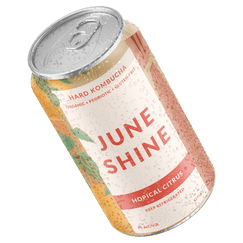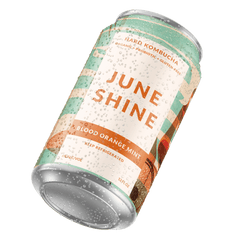What Is Beet Juice Used For? It’s Hiding In Your Favorite Drink!

If you’ve been avoiding beets, you’re missing out. Beets have a rich, earthy taste and, when properly prepared, sweet, almost floral flavor notes. Not to mention the crazy nutritional value you can get from them, whether you blend them, run them through the juicer with some ginger, or enjoy them whole.
We noticed the potential of beets and decided to use them as an ingredient in one of our recipes. But why do we love beet juice so much?
What’s a Beet?
Beta vulgaris might sound like a spell from Harry Potter, but it is actually the scientific name for the root vegetable we know as beets. Beets grow as a round bulb with a leafy top poking out above the soil, kind of like a carrot.
Unlike carrots, beets have a roundish shape that closely mimics a turnip. They are most often a deep ruby red and are sometimes referred to as beetroot to avoid confusion between beets and their leaves, which are also edible. They also come in many other colors, including yellow, white, and striped.
If you are looking to buy some beets, make sure you don’t confuse them with similar-looking root vegetables like radishes. Beets are larger than radishes and have a sweeter taste.
Beets come from the Mediterranean region and were originally used medicinally. It wasn’t until the 1800s, when French chefs recognized the potential of beets, that they took on a starring role in cooking recipes.
What Are the Benefits of Beets?
People tend to love healthy options in the kitchen, and beets have a stellar nutrition profile. It’s what makes them such an Instagram-worthy superfood.
Beetroot juice specifically offers a range of health benefits, and raw beets are chock full of vitamin C. With such a wide array of essential minerals and vitamins, it’s no wonder that so many people are tossing them in the blender.
Vitamins and Minerals
Beets have a lot going on beneath their earthy exterior.
Folate is a B-vitamin found in beets that’s needed to make red and white blood cells in bone marrow, produce RNA and DNA, and convert carbs into energy. Speaking of B-vitamins, B-6 is also found in beets. B-6 supports metabolism and red blood cell production.
Calcium is a classic and essential mineral found in beets that is essential to bone growth and strength.
Another mineral found in beets is magnesium, which supports the immune system, as well as heart, muscle, and nerve health. That’s not to be confused with manganese—but that’s also found in beet juice (surprise!).
Iron and copper are often used in industry, and weirdly enough, they’re also found in your body. Copper helps maintain blood vessels and supports your immune health. Iron, on the other hand, allows red blood cells to carry oxygen.
Rounding out the list of vitamins and minerals in beets are phosphorus and zinc. Phosphorus is an essential nutrient for cell repair, bones, and teeth. Zinc encourages growth and supports the immune system.
Blood Pressure
Beet juice has been shown to help lower blood pressure. Researchers found that due to the high nitrate content of beets, people who drank 8 ounces of beet juice daily lowered diastolic and systolic blood pressure.
The body converts nitrates into nitric oxide, a compound that dilates blood vessels and improves blood flow, which in turn lowers blood pressure.
Beets and Exercise
According to some studies, beets have been shown to boost physical performance and stamina, thanks to those nitrates they provide. The nitrates boost athletic efficiency by increasing blood flow and oxygen to muscles.
Drinking two cups of beet juice daily improved performance for cyclists, shaving time off of their races and reducing their oxygen output.
Beets and Your Liver
Your liver plays an important role in filtering the blood coming from the digestive tract before it passes to the rest of your body. Its function is to detoxify chemicals and metabolize drugs. It then secretes bile that goes back to the intestines. It’s a gross job, but somebody’s gotta do it!
We’ll leave the ickier deets to the scientists, but we do want to say this. Your liver can become overloaded due to a poor daily diet, exposure to toxic substances, and living a sedentary lifestyle.
As you know by now, beetroot juice is high in antioxidants like vitamin A, B-6, iron, and something known as betaine. These antioxidants all help support your liver.
The Power of Beets
We took blood orange, mint, green tea, and Jun Kombucha and added some beet juice to make our dangerously drinkable Blood Orange Mint Hard Kombucha. It’s a tart yet soothing sip of sunshine you are sure to enjoy.
Like all of our delicious flavors, it’s all-natural and organic, without any preservatives, making it better for you and the planet.
Sources:
Beta Vulgaris - an overview | ScienceDirect.com
Beetroot juice: 6 health benefits, nutrition, and how to use it | MedicalNewsToday
The Health Benefits of Beets | Cleveland Clinic
Facts About Hypertension | cdc.gov.
The Potential Benefits of Red Beetroot Supplementation in Health and Disease | nih.gov
Nitrate supplementation's improvement of 10-km time-trial performance in trained cyclists |nih.gov






